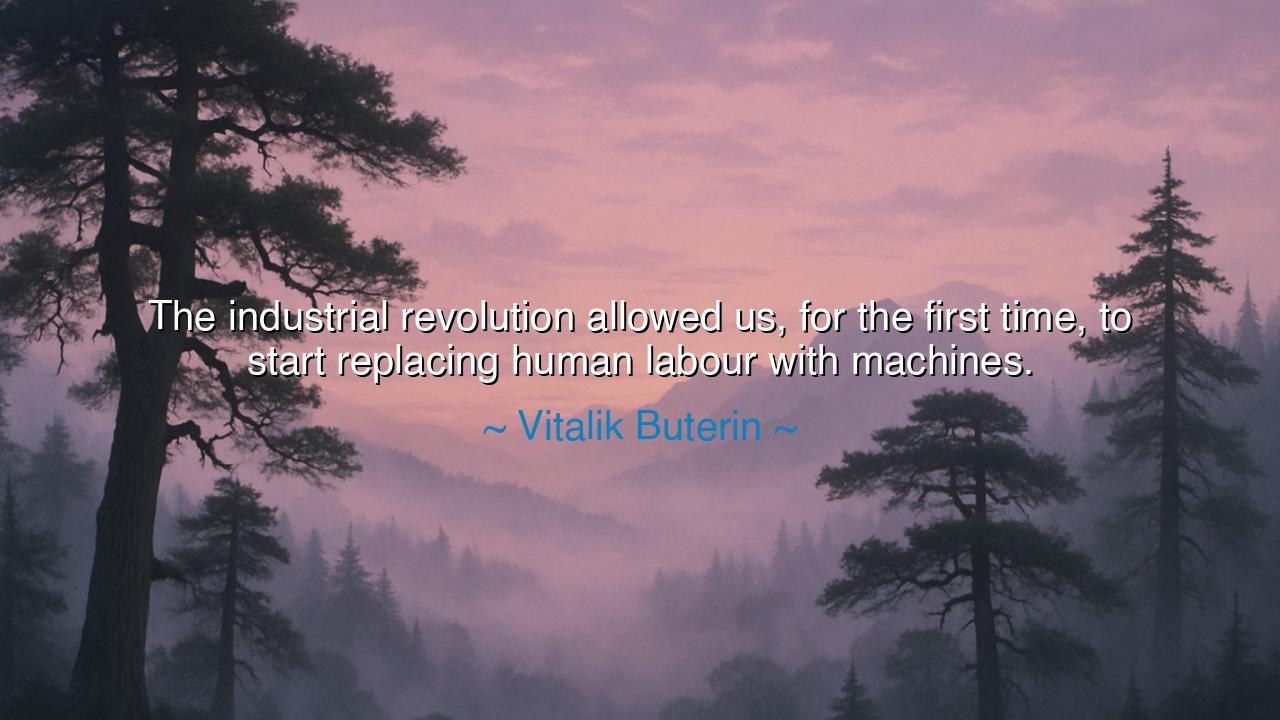
The industrial revolution allowed us, for the first time, to
The industrial revolution allowed us, for the first time, to start replacing human labour with machines.






The thinker and builder of new worlds, Vitalik Buterin, once declared: “The Industrial Revolution allowed us, for the first time, to start replacing human labour with machines.” These words, though born of modern observation, resound with the weight of an epochal turning point in the story of mankind. For in them lies the memory of a time when humanity first seized the thunder of invention and bent it to its will, reshaping the destiny of nations and the rhythm of daily life.
Before that revolution, the toil of existence pressed heavily upon the shoulders of mortals. The plowman bent beneath the sun, the weaver labored long into the night, the miner descended into the earth with sweat and peril. Every loaf of bread, every garment, every spark of fire required the expenditure of human strength. Yet with the rise of machines, man discovered a new companion—iron and steam, gear and piston—who could shoulder burdens once thought eternal. It was as though Prometheus had gifted not only fire, but an army of tireless servants forged from it.
Consider the tale of James Watt, whose refinements to the steam engine transformed it from curiosity to power. Where once horses strained to move carts and men rowed until their arms failed, now engines roared with inexhaustible force. Factories sprang up, not as humble workshops but as vast temples of production, capable of weaving, forging, and shaping with a speed no hand could match. This change, first feared by many, became the foundation upon which modern civilization was built. The Industrial Revolution was not simply invention; it was liberation from certain chains of labor, and at the same time, the forging of new responsibilities.
Yet Buterin’s words carry more than a record of history—they are a mirror for the present. For just as machines once replaced muscle, so now intelligence itself stands at the threshold of transformation. The loom of the weaver was made of iron; today the loom of thought is woven of algorithms. The question rises anew: what will mankind do with such power? Shall it enslave itself to the machines it creates, or shall it use them to lift itself toward higher pursuits—toward wisdom, art, compassion, and the eternal search for truth?
The meaning of the quote is clear: technology is both servant and test. The Industrial Revolution shows us that human labor, when unrelieved, confines the soul to endless survival. But when aided by invention, the body is freed to dream, to create, to think beyond necessity. The danger, however, is forgetting that machines serve, and not rule. The man who lets invention consume him, who worships output above dignity, loses not only his labor but his spirit.
The lesson for us is thus twofold. First, embrace innovation without fear, for it has always been the handmaiden of progress. But second, remember that machines can replace labor, but they cannot replace meaning. A steam engine can drive a wheel, but it cannot paint a vision. A loom can weave cloth, but it cannot weave hope. A computer may calculate, but it cannot love. Therefore, guard your humanity even as you multiply your tools.
Practical action lies in balance: learn the machines of your age, whether plows, engines, or codes, but never forget to cultivate the virtues of the heart—patience, courage, imagination, and compassion. Seek to master your tools, but do not become one. Use the time that invention saves you not for idleness alone, but for learning, for building, for serving. Let machines take from you the burden of repetition, so that your soul may pursue the eternal.
Thus, O seekers of wisdom, carry Buterin’s words as both remembrance and prophecy: the Industrial Revolution was but the first wave of transformation, and more waves will come. Do not fear them, but meet them with wisdom. Let the machines do what they must—but let your spirit remain the master, ever reaching, ever creating, ever free.






AAdministratorAdministrator
Welcome, honored guests. Please leave a comment, we will respond soon